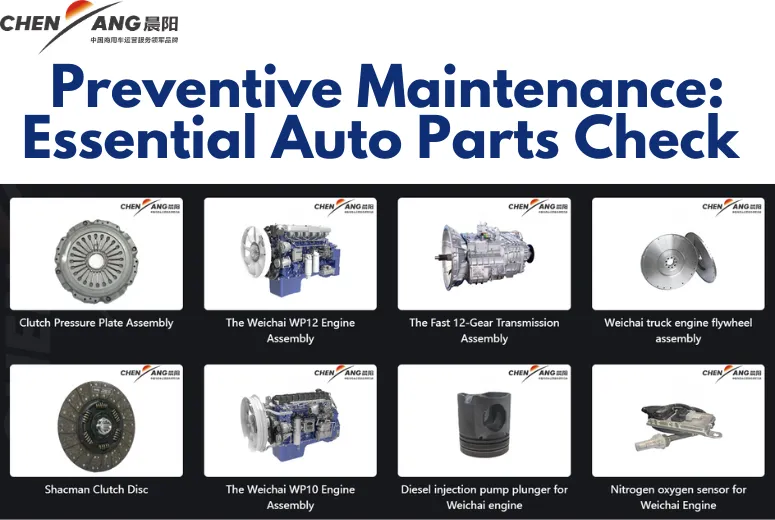Essential Auto Parts to Check for Preventive Maintenance
Preventive maintenance is a critical aspect of vehicle ownership, ensuring reliability, safety, and longevity. By routinely inspecting key auto parts, drivers can address potential issues before they escalate into costly repairs or breakdowns. Understanding which components require regular attention helps maintain optimal vehicle performance and provides peace of mind on the road.

The Importance of Preventive Maintenance
Regular maintenance protects your investment and reduces the risk of unexpected malfunctions. Vehicles consist of numerous interconnected auto accessories, each playing a specific role in overall functionality. Neglecting even minor components can lead to a chain reaction of failures. Preventive care involves proactively identifying wear and tear, replacing car spare parts as needed, and ensuring that every system operates efficiently.
A well-maintained vehicle not only delivers a smoother driving experience but also retains its value over time. Additionally, staying on top of maintenance enhances fuel efficiency and minimizes environmental impact, making it both a practical and responsible practice.
Tires and Braking System
Tires and brakes are critical for safety and performance. Regularly inspect tire tread depth and pressure to ensure proper traction and handling. Uneven wear can indicate alignment or suspension issues that need addressing. Proper tire care extends lifespan and enhances fuel efficiency.
The braking system demands equal attention. Check brake pads, rotors, and brake fluid levels periodically. Squealing noises or decreased responsiveness signal the need for immediate maintenance. Ensuring a fully functional braking system is vital for accident prevention and overall vehicle safety.
Battery and Electrical Components
A vehicle’s battery is essential for starting the engine and powering electrical systems. Inspect it for corrosion, secure connections, and sufficient charge. Extreme temperatures and prolonged periods of inactivity can affect battery life, so consider testing its health regularly.
Electrical components such as lights, fuses, and wiring should also be checked. Faulty connections or dim lights can indicate issues that need resolving. Ensuring all electrical systems are operational enhances visibility and safety.
Engine and Oil System
The engine is the heart of your vehicle, and its health depends on regular oil changes and inspections. Monitor oil levels and quality to prevent excessive friction and wear. Clean oil lubricates engine components, reduces heat, and optimizes performance.
Other engine components, such as belts and hoses, also require attention. Cracks, leaks, or fraying can lead to engine failure or overheating. Promptly replacing worn parts prevents further damage and maintains engine efficiency.
Cooling and HVAC Systems
The cooling system regulates engine temperature and prevents overheating. Regularly check the coolant level and inspect the radiator for leaks or blockages. A malfunctioning cooling system can cause engine overheating, resulting in severe damage.
The HVAC system, while not directly tied to engine performance, contributes to comfort and safety. Ensure proper airflow and replace cabin air filters as needed to maintain air quality and avoid strain on the system.
Suspension and Steering
A well-functioning suspension system absorbs road shocks and ensures a smooth ride. Inspect shock absorbers, struts, and suspension joints for signs of wear or leakage. A deteriorating suspension can compromise handling and lead to uneven tire wear.
Steering components, including the power steering fluid and linkages, should also be checked. Difficulty steering or unusual noises when turning signal potential issues that need addressing. Maintaining these systems enhances control and driver confidence.
Exhaust and Emissions System
The exhaust system plays a crucial role in reducing emissions and maintaining engine efficiency. Inspect it for leaks, rust, or loose connections that may affect performance or lead to increased pollution. A faulty exhaust system can also impact fuel efficiency and cause unpleasant odors.
Modern vehicles often include sensors and catalytic converters in the emissions system. Regular diagnostics help identify problems early, ensuring compliance with environmental standards and avoiding fines.
Keeping Your Vehicle Road-Ready
Preventive maintenance is the cornerstone of vehicle reliability. By regularly checking essential auto parts, you can identify potential problems early and address them before they become serious. This approach saves time and money while ensuring a safer and more enjoyable driving experience.
Commit to a maintenance schedule tailored to your vehicle’s needs, considering factors such as mileage, driving conditions, and manufacturer recommendations. Partnering with a trusted mechanic or service center further enhances your ability to keep your vehicle in peak condition.
-
Low Maintenance + High Availability of Ownership for Mining Dump TruckNewsJul.17,2025
-
Drum Drive Axle + Air Suspension for Electric Tractor TruckNewsJul.17,2025
-
33m Boom + Full Hydraulic Outriggers: Narrow-Site Construction Practices of Mixer Pump TruckNewsJul.17,2025
-
18L Large Drum + Extended Drain Interval of Gear Oil for Heavy Duty TrucksNewsJul.17,2025
-
13m Cargo Space + Polyurethane Insulation: Long-Term Cold Chain Protection Solutions for Refrigerated Semi-Trailers for SaleNewsJul.17,2025
-
10T Water Tank + 2.5MPa Fire Pump Efficiency Analysis of Water Tank Fire TruckNewsJul.17,2025
Popular products

























